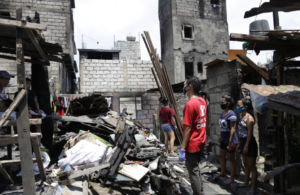Save the Children Philippines is calling for the fulfillment of children’s rights to safe, adequate, and resilient shelter as they face compounding health and protection risks amid the COVID-19 pandemic.
October 5 is World Habitat Day and the child rights organization maintained that access to adequate housing is much more important today for millions of children living informal settlements.
Atty. Alberto Muyot, Chief Executive Officer of Save the Children Philippines, said adequate, secure, and resilient housing is critical to the realization of every child’s right to physical, mental, spiritual, moral, and social development.
“While it is the responsibility of parents and guardians to secure a safe and secure living condition for their children, the mandate of the national and local governments is to ensure every child has access to adequate housing,” Muyot said.
In 2011, the National Economic Development Authority (NEDA) reported that there are some 1.5 million informal settler families, about 767,500 of them living in high-risk areas such as esteros, along railroad tracks, garbage dumps, riverbanks, and waterways.
Muyot also called for the full stop of all demolition of informal settlements unless the families are in high-risk areas.
He lamented that 120 families were evicted from their homes in Pasay City last March 12, three days before Luzon was placed under enhanced community quarantine. These families had to stay on the streets, putting them and their children at risk of getting infected by the Coronavirus.
Also during the community quarantine, a fire broke out in Pasay City leaving 184 families, many of them with children, homeless. Save the Children Philippines distributed relief food packages, groceries, fresh produce, and hygiene kits to children and their families then staying at the Pasay City North High School and provided information on protection against COVID-19.
Muyot said children who live in informal settlements have higher risks of getting infected by the Coronavirus and other life-threatening diseases including diarrhea, typhoid fever due to lack of access to safe water and sanitation.
He added that children in informal settlements are exposed to multiple risks from psychosocial distress and physical abuse and violence due to the presence of street gangs and children in conflict with the law.
With the onset of typhoon season and La Nina, children and their families living in informal settlements face frequent flooding, putting them at risk to all water-related vector-borne diseases.
“Children and their families who live in informal settlements face injury, loss of life and belongings during extreme weather events such as typhoons, storm surges, and massive flooding,” said Atty. Muyot.
Save the Children Philippines implements the Building Urban Children’s Resilience against the Shocks and Threats of Resettlement (BURST) to ensure children living in informal settlements are protected from harm, have access to quality and inclusive education, and health and social services. The project also strengthens the coordination of local government units (LGUs) both hosting informal settlers and where the families will be relocated.
The child rights organization, together with other civil society organizations called for the enactment of Senate Bill 1081, or the Just and Humane Resettlement Act (JAHRA), and the proposed Least Displacement of Informal Settler Families Act (LISA) to prevent and address the adverse impacts of homelessness, displacement, and relocation on the lives of children in informal settlements and relocation sites. The bills will also support programs for underprivileged and homeless citizens to have access to safe, secure, habitable, sustainable, resilient, and affordable housing.
The JAHRA bill seeks to establish housing and resettlement systems that are sensitive to children’s needs and concerns. It prohibits the eviction and demolition of informal settlements before the evicting authority has complied with mandatory requirements before, during, and after demolition.





